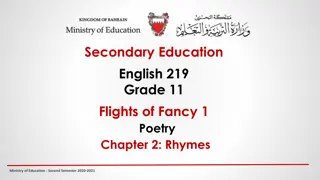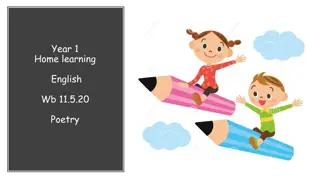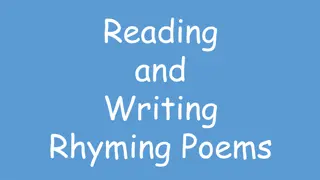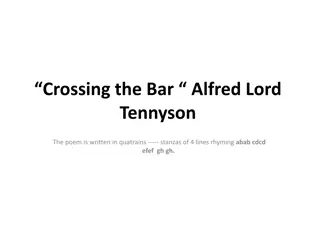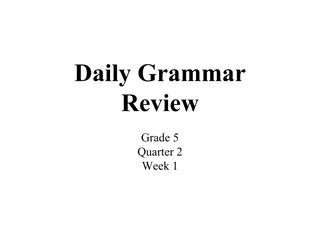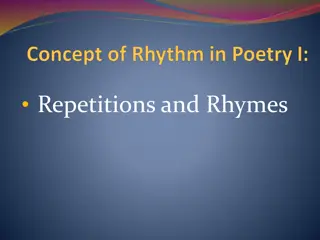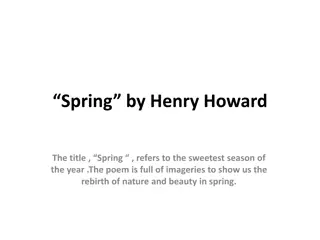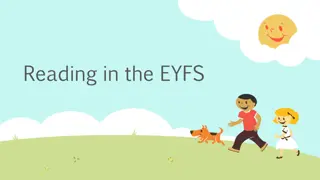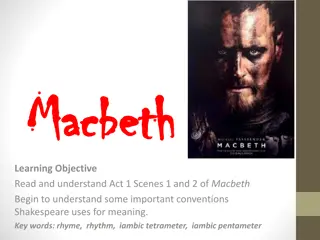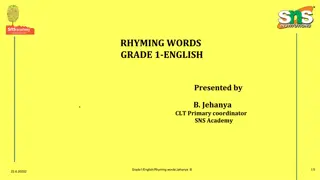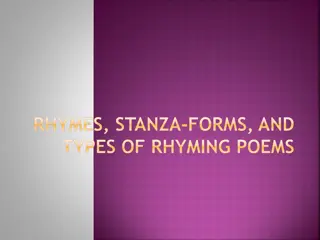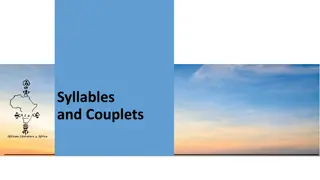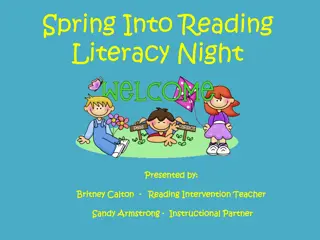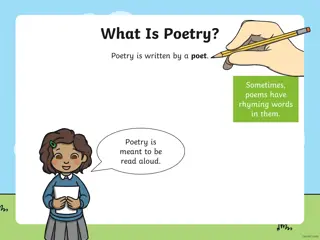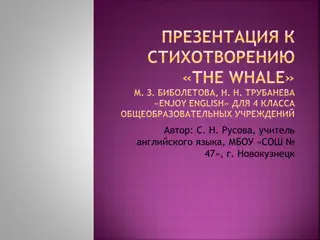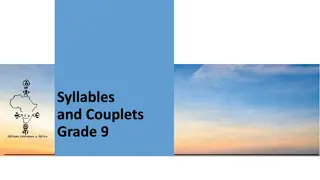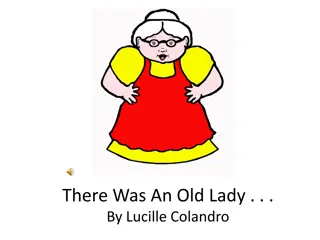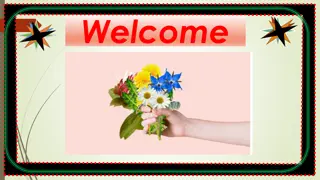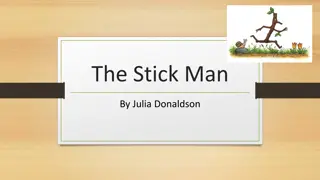Exploring Rhymes in Poetry: Eng. 219 Chapter 2
Understand the importance of rhymes in poetry, learn about poetic elements, and test your knowledge by matching rhyming words. This lesson aims to enhance your comprehension and creativity in writing rhymes. Dive into the world of poetry with Eng. 219.
3 views • 19 slides
Enhancing Literary Understanding: A Journey with Md. Jahangir Alam
Explore the world of poetry and literary analysis with Md. Jahangir Alam, a Senior Assistant Teacher at Majhira Model High School. Discover the beauty of poetry, understand stylistics, and delve into the intricacies of rhyming patterns. Gain insight into concepts like stanza, word patterns, and the
3 views • 15 slides
Explore the World of Connected Speech with Matt Purland
Discover the power of connected speech through an 8-part English pronunciation course by Matt Purland. Dive into lessons on VC connections and reduplicative rhyming words, with fun quizzes to practice and enhance your language skills.
1 views • 8 slides
Exploring Nonsense Poetry with Year One Students
Delve into the world of Nonsense poetry with Year One students as they explore rhyming words, create new endings for nursery rhymes, and decipher classic rhymes like "Mary Had a Little Lamb" and "Humpty Dumpty." Engage in creative activities that spark imagination and laughter, making learning Engli
0 views • 14 slides
Fun with Rhyming: Create Animal-themed Poems
Dive into the world of rhyming words and create delightful animal-themed poems using rhyming word pairs. Learn how to identify rhyming words, work out rhyme schemes, and craft a charming four-line poem following the A.A.B.B rhyme pattern. Unleash your creativity by exploring various rhyming pairs an
1 views • 7 slides
Fun with Food: Rhyming Poems by Kenn Nesbitt
Delight in the whimsical world of rhyming food poems by American poet Kenn Nesbitt. Get lost in charming verses about overeating, chocolate indulgence, giant lasagnas, and a child's imaginative lunch creation. Unleash your creativity by crafting your own rhyming food poem following Kenn's helpful st
0 views • 10 slides
Analysis of "Crossing the Bar" by Alfred Lord Tennyson
The poem "Crossing the Bar" by Alfred Lord Tennyson is written in quatrains, with each stanza of 4 lines rhyming abab, cdcd, efef, ghgh. The poet contemplates the journey from life to death, symbolized by crossing a sand bar. Through the sunset, tide, stages of life, and evening bell, the poet expre
0 views • 5 slides
Grade 5 Quarter 2 Week 1 Daily Grammar Review
Engage in daily grammar practice with exercises focusing on sentence structure, word order, rhyming words, homophones, prepositional phrases, synonyms, antonyms, adverbs, dates, and identifying parts of speech. Improve your grammar skills progressively through the week.
0 views • 60 slides
Understanding Repetitions, Rhymes, and Rhythm in Poetry
Explore the significance of repetitions, various rhyming patterns, and the essence of rhythm in poetry through examples of phonetic rhymes, couplets, and traditional Yoruba poems. Delve into how these literary devices enhance the poetic structure and emphasize the meaning of poems.
0 views • 12 slides
Analysis of "Spring" by Henry Howard
The poem "Spring" by Henry Howard beautifully captures the essence of the season, showcasing the rebirth of nature and the beauty that comes with it. Through vivid imagery and poetic devices, the poem progresses from the emergence of spring and its delightful transformations to the anticipation of s
0 views • 6 slides
Reading Expectations and Teaching Strategies in EYFS
Explore the reading expectations for Nursery and Reception children in the EYFS, covering rhyming activities, phonics, book handling, and early reading skills. Discover effective teaching methods such as using a love of reading, book selection, reading strategies, and interactive guided reading sess
0 views • 12 slides
Understanding Shakespeare's Conventions in Macbeth Act 1 Scenes 1 and 2
Explore the importance of rhyme, rhythm, iambic tetrameter, and iambic pentameter in Act 1 Scenes 1 and 2 of Macbeth. Dive into the conventions Shakespeare uses for conveying meaning, including the use of rhyme in verse, rhyming couplets, and the significance of rhythm in the witches' opening scene.
0 views • 16 slides
Understanding Rhyming Words in Grade 1 English
Rhyming words are two or more words that have the same or similar ending sound. Examples include "goat," "boat," "moat," "float," and "coat." To determine if two words rhyme, listen carefully as you say them - if they sound the same or similar, they rhyme.
0 views • 5 slides
Understanding Rhymes, Stanza Forms, and Types of Rhyming Poems
Explore the world of rhymes through couplets, tercets, quatrains, sixains, and sonnets. Learn about different stanza forms and types of rhyming poems like Italian sonnets and the structure of a sonnet. Unveil the beauty and complexity of poetic composition in various rhyming schemes.
0 views • 14 slides
Understanding Meter, Rhyme, and Verse in Poetry
Explore the fundamentals of meter, rhyming couplets, and iambic pentameter in poetry. Delve into the structure of different poetic forms and learn how to scan lines to identify poetic feet and syllables. Discover the timeless elegance of Shakespeare's Sonnet 116 as an example of poetic excellence.
1 views • 11 slides
Early Literacy Development Overview
Explore the key components of early literacy development from literacy night events and grade expectations. Presented by Britney Calton and Sandy Armstrong, delve into reading intervention, instructional partnerships, and foundational reading skills like phonemic awareness, phonics, vocabulary, flue
0 views • 19 slides
Exploring Poetry: Rhymes, Shapes, and Forms
Poetry is a form of creative expression written by poets, often including rhyming words and meant to be read aloud. This content delves into the elements of poetry such as rhymes, shape poems, cinquains, haikus, and riddles, encouraging engagement and understanding of various poetic forms.
0 views • 11 slides
Fun English Activities with a Whale Theme for Kids
Engage children in learning English with entertaining activities involving numbers, rhyming words, and storytelling about a playful whale. This interactive content features matching exercises, rhyming challenges, and a delightful story of catching and releasing a whale. With colorful visuals and eng
0 views • 12 slides
Exploring Meter and Rhyming Couplets in Poetry
Understanding the concept of meter, syllables, and emphasis in poetry, as well as exploring the use of rhyming couplets through examples and a classic poem. Dive into the world of rhythm and rhyme, and unleash your creativity by writing your own poem using this structured form.
0 views • 5 slides
Rhyming Adventure with an Old Lady's Unusual Appetite
Join the whimsical journey of an old lady who swallows a variety of school supplies in an unexpected sequence. From books to a bag, each item she consumes serves a unique purpose, creating a fun and quirky tale filled with humor and surprises. Delve into this entertaining story by Lucille Colandro a
0 views • 12 slides
Fun and Engaging English Lesson on Counting Cats for Grade One Students
Join Assistant Teacher Md. Azgar Ali at Lalbag Govt Primary School in Comilla for an interactive English lesson where students will enjoy rhymes, counting cats, and exploring different colored cats. The lesson focuses on listening and speaking skills, allowing students to practice rhyming and counti
0 views • 14 slides
Explore Rhymes with The Stick Man Story
Dive into the enchanting world of The Stick Man by Julia Donaldson as you listen to the story and uncover the magic of rhymes. Discover what rhyming words are, find rhymes in the text, and challenge yourself with fun worksheets to enhance your rhyming skills. Engage with the narrative, unleash your
0 views • 5 slides
